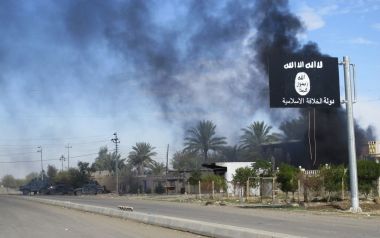Islamic State one year on: A 'potent' force, says Pentagon

A year after Islamic State declared a caliphate on territory seized in Iraq and Syria, the al Qaeda splinter group faces military pressure from a US-led coalition but remains a potent force holding key cities, the Pentagon said on Monday.
Army Colonel Steve Warren, a Defense Department spokesman, said the militant group has lost a quarter of the land it controlled at the height of its expansion and has broken and run on several occasions in northern Syria in the face of an offensive by Kurdish-led forces.
But Islamic State militants still control the Iraqi city of Mosul, where leader Abu Bakr al-Baghdadi appeared last July to declare himself the head of the new caliphate, which had been proclaimed on June 29, 2014. The group recently captured the key Sunni city of Ramadi, the capital of Iraq's vast western province of Anbar.
"It's a tough fight. We said a year ago that we expected this fight to expel ISIL from Iraq to be a fight that takes years, with an 's'. Years," Warren said.
"ISIL has lost well over 25 percent of the territory that they held at the height of their incursion into Iraq. We have destroyed thousands of pieces of equipment," he added. "We believe that we are having impact."
But he also noted the group is still capable of mustering enough combat power to create the kind of destructive havoc seen last week in the Syrian city of Kobani, where hundreds of civilians were killed by vehicle bombs or shot.
Warren described the Kobani attack as a "limited incursion," noting the militants had been "beaten out of there" by local forces and US-led air strikes.
He also said anti-ISIL forces had established an unbroken line, running near the Turkish border from the Iraqi frontier to just west of Kobani, a stretch of nearly 250 miles (400 km).
When the assault on Kobani occurred, anti-ISIL and coalition forces were focused on strengthening that line near the town of Tel Abyad in order to cut off the flow of foreign fighters and supplies slipping across the border from Turkey.
"That is obviously an indicator that ISIL is still able to...conduct attacks. But the fact that they were so rapidly beaten out of there says ISIL isn't as powerful as they would like you to believe," Warren added.











